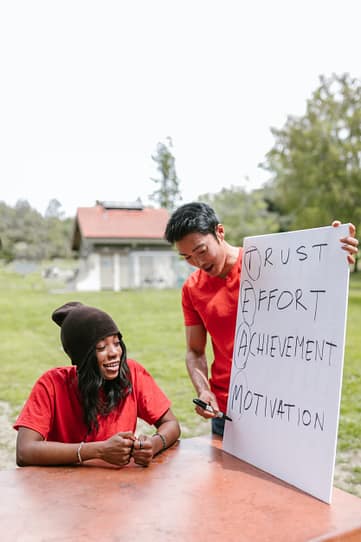Building trust in a team is crucial for its success. Trust allows team members to rely on each other, collaborate effectively, and achieve common goals. While building trust is a collective effort, individuals can take several measures to contribute to this process.
One measure to build trust in your team is to communicate effectively. This involves being clear and concise in your messages, actively listening to others, and providing constructive feedback. Open communication helps to establish transparency, which is essential for building trust. When team members communicate effectively, they are less likely to misunderstand each other, and they can work together to resolve conflicts and achieve their objectives.
For example, if you are working on a project and you are unsure of your role, you can communicate with your team members and ask for clarification. This shows that you are willing to seek help and work collaboratively. In turn, your team members may be more likely to trust you and rely on you for future projects.
Another measure is to demonstrate reliability. This involves fulfilling your commitments and delivering on your promises. When team members can depend on each other to follow through on their responsibilities, trust is strengthened. It’s important to be honest about what you can and can’t do, and to communicate any issues or delays in a timely manner. This ensures that everyone is on the same page and can adjust their plans accordingly.
For example, if you promise to complete a task by a certain date, and you realize that you won’t be able to meet that deadline, you can communicate this to your team members as soon as possible. This allows them to adjust their plans accordingly and shows that you are reliable and committed to the project.

Showing vulnerability is also an effective measure to build trust. Admitting mistakes and seeking help when necessary shows that you are human and willing to learn. This can create a safe space for team members to do the same, which can lead to stronger bonds and more trust. When team members admit to their mistakes, they can work together to find solutions and prevent similar issues from arising in the future.
For example, if you make a mistake in a project, you can admit to it and work with your team members to find a solution. This shows that you are willing to take ownership of your mistakes and work collaboratively to fix them. In turn, your team members may be more likely to trust you and feel comfortable admitting their own mistakes in the future.
Finally, showing empathy is a powerful measure to build trust. When team members feel understood and supported, they are more likely to trust each other. This involves putting yourself in others’ shoes, acknowledging their feelings and perspectives, and responding with kindness and respect. When team members show empathy towards each other, they are more likely to collaborate effectively, and they can build stronger relationships.
For example, if a team member is going through a difficult time, you can show empathy by listening to them and offering support. This shows that you care about their well-being and are willing to support them as a colleague and a friend. In turn, your team member may be more likely to trust you and feel comfortable confiding in you in the future.
In conclusion, building trust in a team is a continuous process that requires effort from everyone. As an individual, you can contribute to this process by communicating effectively, demonstrating reliability, showing vulnerability, and demonstrating empathy. By doing so, you can help create a positive and productive team environment built on trust. This will not only make your team more successful, but it will also make your work more enjoyable and fulfilling.